Unit 8 Being Independent Tiếng Anh Lớp 11 Global Success 19.02.2024
Thầy Thắng
CHUYÊN ĐỀ LỚP 11
15
Ngày đăng: 19-02-2024 07:49:39
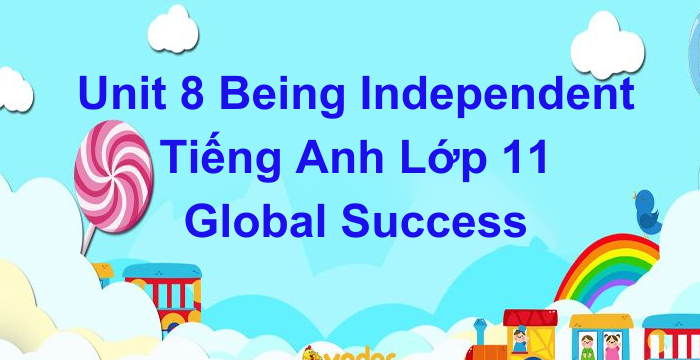
Các bạn có thể tham khảo file nghe Unit 8 Being Independent Tiếng Anh Lớp 11 Global Success tại đây.
MORE PRACTICE
Mark the letter A, B, C, or D to indicate the word whose underlined part differs from the other three in pronunciation in each of the following questions.
1. A. amazing B. management C. female D. taste
2. A. thoughtful B. threaten C. therefore D. thanks
3. A. stopped B. expected C. finished D. faced
4. A. figure B. decisive C. strive D. advice
5. A. recently B. coach C. decisive D. conceal
6. A. permission B. essential C. necessary D. possible
7. A. ability B. attempt C. admire D. manage
8. A. touch B. round C. ground D. shout
9. A. breath B. threat C. learner D. health
10. A. return B. repair C. connect D. response
Mark the letter A, B, C, or D to indicate the word that differs from the other three in the position of primary stress in each of the following questions.
1. A. reliant B. decisive C. determined D. possible
2. A. approach B. figure C. advice D. response
3. A. difficult B. interesting C. ambitious D. probable
4. A. cultural B. confident C. critical D. important
5. A. routine B. problem C. money D. hygiene
6. A. successful B. essential C. humorous D. unselfish
7. A. borrow B. provide C. destroy D. succeed
8. A. consequence B. factory C. hospital D. prediction
9. A. performance B. influence C. musician D. ambition
10. A. medical B. practical C. adequate D. rewarding
VOCABULARY
Mark the letter A, B, C, or D to indicate the word(s) CLOSEST in meaning to the underlined word(s) in each of the following questions.
1. Thomas is very reliable - if he says he'll do something, he'll do it.
A. mean B. independent C. decisive D. dependable
2. She will get the job she wants - she's a very determined person.
A. tenacious B. serious C. dependent D. necessary
3. Despite poverty and difficult living conditions, John still manages to keep his self-esteem.
A. self-abasement B. self-restraint C. self-respect D. self-confidence
4. It is lazy of her for not doing her assignment every day.
A. idle B. industrious C. hard-working D. diligent
5. The skills needed to succeed in college are very different from those required in high school
A. assiduous B. divergent C. unsafe D. attractive
6. Students should know how to interact appropriately with instructors, college staff, roommates, and peers.
A. relatives B. cobbers C. enemies D. colleagues
7. We were upset to see smoke pouring out of the roof.
A. indifferent B. happy C. worried D. troublesome
8. I managed to convince them that I'm responsible when I’m out and about.
A. differ B. persuade C. encourage D. contact
9. Shall we now talk about other learning methods?
A. approach B. attention C. trust D. motivation
10. It is important for us to learn how to manage our time and money.
A. discover B. control C. apply D. discharge
Mark the letter A, B, C, or D to indicate the word(s) OPPOSITE in meaning the underlined word(s) in each of the following questions.
1. My parents also encourage me to take part-time jobs and pay me for doing certain chores around the house.
A. offer B. discourage C. impact D. imagine
2. Teenagers should do some part-time jobs and get to know how to manage their money
A. full-time B. temporary C. permanent D. administrative
3. Nam is considered to be the best student in our class because he's not only good at learning but also well-informed about everything around the world.
A. perfectly-informed B. badly-informed C. bad-informed D. ill-informed
4. Many young people feel reluctant to talk openly with their parents.
A. generous B. willing C eager D. fond
5. The books on this list are essential for the course.
A. important B. dispensable C. vital D. basic
6. My landlord's very mean with the heating - it's only on for two hours each day.
A. unkind B. cruel C. miserable D. generous
7. Don't confess your love to your friends unless you know they feel the same way.
A. blame B. conceal C. declare D. defer
8. I look up to my father for my whole life.
A. sit in for B. stand up fort C. look down on D. sit in on
9. I tried to conceal my surprise when she told me her age.
A. confess B. display C. hint D. recharge
10. The situation seemed hopeless and desperation filled them both with anger.
A. pessimistic B. pointless C. promising D. useless
Mark the letter A, B, C, or D to indicate the correct answer to each of the following questions.
1. It was essential for him to be financially ________ of his parents, so he decided to find a part-time job.
A. indifferent B. independent C.invaluable D. inefficient
2. Thanks to many investors, my biggest dream to set up my own trading company came ________.
A. exactly B. real C. right D. true
3. His dedication to the educational charity was truly ________.
A. admirable B. reliable C. challenging D. disapproving
4. The director informed that no candidates ________ all the criteria for the administrative position.
A. completed B. fulfilled C. achieved D. suited
5. ________ time-management skill is a core requirement for this job.
A. Solving B. Adapting C. Developing D. Mastering
6. I was encouraged to ________ for the grandest prize in the dancing competition.
A. try B. strive C. reach D. achieve
7. That Tom is ________ of finishing the research project prior to the deadline satisfied our manager.
A. able B. skillful C. capable D. talented
8. We've divided the group report into three parts and you're ________ for the conclusion one.
A. responsible B. irresponsible C. response D. responsive
9. You should make a list of things to do and ________ them if you want to work effectively.
A. do B. arrange C. prioritise D. approach
10. Despite my parents' disagreement, I'm ________ to drop out of university and establish my own business.
A. determined B. confident C. successful D. energetic
11. He ________ me about the lecture yesterday. Otherwise, I would have missed it completely.
A. requested B. forced C. advised D. reminded
12. The government must take ________ action against environmental pollution.
A. important B. unstable C. decisive D. indispensable
13. When being assigned difficult exercises, Lan always _________ to complete them without any help from her teacher.
A. confesses B. manages C. demands D. supposes
14. Our enterprise is seeking for candidates who are _________ and hard-working.
A. reliant B. satisfactory C. unreliable D. reliable
15. _________ communication skill plays an important role in career success.
A. Personal B. Individual C. Interpersonal D. Interactive
16. If you have feelings for someone, then you have worked up the __________ to ask them out.
A. encourage B. encouragement C. courage D. courageous
17. Warmth, _________, and understanding should cost nothing in any country.
A. sympathy B. sympathetic C. sympathise D. sympathising
18. Talking to professional counsellors who are trained to help people to process feelings, can be most _________.
A. beneficial B. beneficially C. beneficiary D. benefit
19. They said it was a great chance to form new friendships and enjoy each other's __________.
A. companion B. companionable C. companionship D. company
20. Someone who is opposed to great or sudden social changes and shows that she/he prefers traditional styles and values is a ________ person.
A. enthusiastic B. conservative C. sympathetic D. unfriendly
21. These days, many people _________ leading an independent life.
A. attempt to B. work on C. strive for D. head for
22. Simon earned the respect of his friends when he determined to complete such a challenging task while others had already ________.
A. gone off B. given in C. given up D. gone through
23. However hard I tried, I could not keep ________ with the other students in class.
A. face B. pace C. place D. stage
24. Learning to manage your time involves using a variety of _______skills together.
A. life B. society C. communication D. computer
25. When getting into trouble, Jack never __________ on other people for help. He always solves them on his own.
A. determines B. influences C. relies D. manages
26. Many American teenagers have part-time jobs as they want to gain work ___________ and learn how to manage their money.
A. salary B. experience C. relation D. habit
27. It is normal for teens to want more responsibility and _________for their choices.
A. freedom B. right C. bond D. routine
28. Schools also provide extracurricular__________, such as sports, clubs, and bands.
A. competitions B. games C. activities D. programmes
29. The teenage years form an important period of their development that influences ________life.
A. adult B. elder C. young D. child
30. Many American teenagers also volunteer at local hospitals, food banks, and old people's homes, or take part in clean-up activities to _________ their neighbourhood.
A. protect B. improve C. prevent D. support
31. American parents usually encourage ___________in their teenage children.
A. independence B. self-esteem C. orientation D. attitude
32. The ways in which American and Vietnamese teenagers learn to become independent may depend on a variety of_________, including cultural norms, family dynamics, education, and personal experiences.
A. factors B. ingredients C. influences D. feelings
33. First of all, sort your clothes by colour. You should ________ them into whites and colours and wash them separately.
A. slice B. divide C. change D. separate
34. Don’t put too many ___________as they need room to move about in the water.
A. clothes B. items C. pockets D. socks
35. Our teacher mentioned that university students are __________to be independent learners.
A. expected B. supposed C. thought D. believed
36. If they want to earn an academic degree, they can continue their studies at ________ institutions.
A. college B. center C. higher education D. high school
37. He suffered __________ serious depression after losing his beloved pet.
A. in B. from C. with D. for
38. If you choose to study abroad, you have to live __________ from home.
A. on B. away C. in D. up
39. They may also need to spend extra time-solving problems ________ their own, without the benefit of a teacher's guidance.
40. self-study can make learners more confident ________ their abilities to complete tasks independently
A. on B. away C. in D. up
41. __________ my friend came to see me late
A. It was last night that B. It was last night which
C. It was last night when D. It was last night whom
42. _________ the little boy greeted in a strange language.
A. It was his grandfather whom B. It is his grandfather who
C. It was his grandfather that D. It is his grandfather which
43. _________ asked the policeman a lot of questions.
A. It is the pedestrian whom B. It is the pedestrian what
C. It was the pedestrian who D. It was the pedestrian when
44. ___________ the boy scored the goal.
A. It was for his team whom B. It was for his team what
C. It was for his team that D. It was for his team which
45. ___________ my wife gave to me at my last birthday party.
A. It was this T-shirt that B. It is this T-shirt which
C. It was this T-shirt who D. It was this T-shirt whom
46. _________ the woman bought for him.
A. It was the English book which B. It was the English book what
C. It was the English book that D. It was the English who
47. _________ I bought this dictionary.
A. It was from this bookstore that B. I was from this bookstore where
C. It was this bookstore which D. It was this bookstore that
48. It was Thomas _________ to help us.
A. comes B. that comes C. to come D. who came
49. __________ the young man had rescued from the accident.
A. The baby girl B. The baby girl that
C. It was the baby girl whom D. It was the baby girl who
50. __________ my parents gave me a new computer.
A. It was on my birthday when B. It was my birthday on that
C. It was my birthday that D. It was on my birthday that
51. __________ I first met my close friend.
A. It was in Japan that B. It was in Japan who
C. It was Japan that D. It was Japan which
52. ____________ talking to her sister on the phone.
A. It is Thomas’s mother whom is B. It was Thomas’s mother whom is
C. It was Thomas’s mother who is D. It is Thomas’s mother who is
53. ____________ a high level of blood cholesterol.
A. It is eggs that contain B. Those are eggs it contains
C. It is eggs that contains D. It is eggs contain
54. ____________ England won the World Cup.
A. It was in 1966 that B. It was on 1966 that
C. It is in 1966 when D. It is 1966 in that
55. ___________ we are all looking for.
A. That happiness B. It is happiness that
C. Happiness it is that D. Happiness it is
56. ___________ me how to play the drum.
A. It was my uncle who taught B. My uncle who taught
C. It was my uncle taught D. It is my uncle teaching
57. It is Mr John ___________ English at my school.
A. who taught B. who teaches C. that teaches D. B & C are correct.
58. It was my dog __________ neighbors very scared.
A. that made B. who made C. which made D. that making
59. It was Thomas __________ a lot of toys from my father.
A. that gave B. who was given C. that were given D. who giving
60. It was ____________ he gave the whole confidential document.
A. his wife that B. to his wife who C. that his wife D. whom his wife
61. It is the floor _________ by his wife every evening.
A. which cleaned B. that cleaned C. that were cleaned D. that is cleaned
62. It was ___________ my father bought a new car.
A. that last Sunday B. last Sunday that C. last Sunday which D. last Sunday when
63. _____________ she sent a postcard.
A. It is her friend that B. It was her friend which
C. It was that her friend D. It was her friend that
64. ____________ that we often gather for our study.
A. It is at her house B. It is on her house C. It is from her house D. It was at her house
65. It was that singer __________ was given a lot of flowers.
A. which B. who C. whom D. whose
66. ___________ you can kill computer viruses.
A. It is by using this software who B. It is by using this software whom
C. It is by using this software that D. It is of using this software that
67. __________ people have fewer dating rules than any other places in the world.
A. It is people in the Netherlands that B. It is in the Netherlands that
C. It is the Netherlands that D. It was in the Netherlands where
68. ____________ that the boy scored the goal.
A. It is for his team B. It was his team C. It is his team D. It was his team
69. ___________ that a South Korean often holds during a date.
A. It is his girlfriend B. It was his girlfriend's handbag
C. It is his girlfriend's handbag D. It is his handbag
70. ___________ dating is not allowed in Central and South America.
A. It is until the age of 15 that B. It is not until the age of 15 that
C. It is the age of 15 that D. It is until the age of 15 who
WORD FORM
1. My parents thought I didn’t have the ____________ to deal with difficult situations. (CONFIDENT)
2. Money-management app taught me how to be ____________ with money. (RESPONSIBILITY)
3. Becoming independent is not easy, but it is not as _____________ as you may think. (CHALLENGE)
4. There are some necessary skills that you should learn to achieve ____________for the future. (DEPEND)
5. Teenagers need to learn how to be ______________ intelligent and how to develop positive relationships with others. (EMOTION)
6. It's the ____________ for learning that makes people study hard. (MOTIVATE)
7. They take responsibility for their own learning and __________seek out resources and opportunities to improve their knowledge and skills. (ACTIVE)
8. They set clear and specific learning goals and ___________ assess their progress toward achieving them. (REGULAR)
9. They think outside the box and find ____________ ways to solve problems and achieve their goals. (INNOVATE)
10. They also volunteer at local hospitals, food banks, and old people's homes, or take part in clean-up activities to improve their ______________. (NEIGHBOR)
Mark the letter A, B, C, or D to indicate the underlined part that needs correction in each of the following questions.
1. It is his dishonesty what I dislike the most.
A B C D
2. My students are not so good at Mathematics, but they study English good.
A B C D
3. They are accustomed to share every sorrow and mirth with each other.
A B C D
4. Most important, I can quickly either start or end an online relationship whenever I want.
A B C D
5. It was a warm and cosy coffee shop in where they had their first date.
A B C D
6. It was at the age of 25 who he bought two houses at 25 Pasteur Street in HCM city.
A B C D
7. Your success in learning depends on your willing to acquire new knowledge.
A B C D
8. Thomas is looking forward to return to his country after finishing four years at university in Australia.
A B C D
9. It is particularly interested to explore the mystery of the universe.
A B C D
10. Thomas’s parents are very sadly to see that he doesn't usually do his homework.
A B C D
SPEAKING
Mark the letter A, B, C, or D to indicate the correct response to each of the following exchanges.
1. John and Mary are talking to each other.
John: “What's the appearance of your younger sister?”
Mary: "____________"
A. She enjoys being a high school student. B. My sister attends a university.
C. She works really hard and is quite kind. D. She has long hair and is tall and skinny.
2. John and Mark are talking to each other.
John: “Dr. Thomas can see you next Thursday. Which time of day do you prefer?”
Mark: “_______________”
A. That is acceptable. B. Morning is best for me.
C. The prospect of seeing you excites me. D. I appreciate you.
3. John and Mary are talking to each other.
John: "Has Mark completed his assignment yet, Mary?"
Mary: "_____________"
A. He has, indeed. He still hasn't completed it. A. No, he hasn't. He's excessively industrious.
C. No, he hasn't, despite doing well in school. D. No, due to his condition, he hasn't.
4. John and Mary are talking to each other.
John” “Why do you enjoy popular music?”
Mary: “______________________"
A. Pop music was created in the West. B. Because it is soft and lovely.
C. A pop group called Martin. D. Pop has included some fresh aspects since the 1950s.
5. Lisa and Mary are talking to each other.
Lisa: "Remember this. We have a dinner invitation tonight.”
Mary: "_____________"
A. Oh, I almost forgot. B. It is very memorable.
C. Okay, I'll give it a shot first. D. I always remember you.
6. John and Mary are talking to each other.
John: "Can you provide me with some details about the new course?"
Mary: "____________"
A. Excellent. I appreciate you. B. No. I'm scared not.
C. I can't help doing it. D. Certainly
7. John and his teacher, Mary are talking to each other.
Teacher: "John, you're late again."
John: "_____________"
A. It's not your concern. B. The clock has run out.
C. I’m sorry. This morning, my car wasn't working. D. I hope not.
8. Denny and his mother are sitting in the living room.
Denny: "Mom, may I go away to Africa to aid those who are in need there?"
Denny’s mother: "______________"
A. Please, yes. You should put studying first. B. It’s my pleasure.
C. You've run out of time, no way. D. Of course, it is. That is a good decision to make..
9. Tom and Tim are talking about films.
Tom: “In my opinion, Action movies are incredibly exciting.”
Tim: “__________________. They always excite me.”
A. I couldn’t agree more! B. You shouldn’t say so! C. What a mess! D. That's wrong.
10. John and Mary are talking to each other.
Mary: “Would you please keep an eye on this bike?”
John: “_____________”
A. Not at all! B. Yes, the bike pleases my eyes!
C. Certainly! D. Don't mention it.
READING COMPREHENSION
Read the following passage and mark the letter A, B, C, or D to indicate the correct answer to each of the questions.
A month ago, I had no idea that on a Saturday afternoon in November I’d be hanging 30 metres above the ground and enjoying it. Now I looked down at the river far below me, and realised why people love rock-climbing.
My friend Matt and I had arrived at the Activity Centre on Friday evening. The accommodation wasn’t wonderful, but we had everything we needed (beds, blankets, food), and we were pleased to be out of the city and in the fresh air.
On Saturday morning we met the other ten members of our group. Cameron had come along with two friends, Kevin, and Simon, while sisters Carole and Lynn had come with Amanda. We had come from various places and none of us knew the area.
We knew we were going to spend the weekend outdoors, but none of us was sure exactly how. Half of us spent the morning caving while the others went rock- climbing and then we changed at lunchtime. Matt and I went to the caves first. Climbing out was harder than going in, but after a good deal of pushing, we were out at last – covered in mud but pleased and excited by what we’d done.
1. What is the writer trying to do in the text?
A. advertise the Activity Centre. B. describe some people she met.
C. explain how to do certain outdoor sports. D. say how she spent some free time.
2. What can the reader learn from the text?
A. when to depend on other people at the Centre.
B. how to apply for a place at the Centre.
C. what sort of activities you can experience at the Centre.
D. which time of year is best to attend the Centre.
3. How do you think the writer might describe her weekend?
A. interesting B. uncomfortable C. scared D. unpleasant
4. The word “various” in the third paragraph is closest in meaning to _______.
A. worthy B. divergent C. meaningless D. significant
5. What do we learn about the group?
A. Some of them had been there before. B. They had already chosen their preferred activities.
C. Some of them already knew each other. D. They came from the same city.
Read the following passage and mark the letter A, B, C, or D to indicate the correct answer to each of the questions.
MANAGING TIME
Time management: two words that have me breaking out in a cold sweat. Why should I suddenly have to learn how to manage my time? Surely time had got on perfectly well for several millennia without requiring management, let alone by me. But my university tutor was adamant: time needed some managing and apparently it was up to me to do it.
First of all, let's be clear. I do have plenty of time to manage. As an arts student, I generally have 23 hours in the day that aren't given over to going to lectures. But I generally need somebody to tell me what I should be writing, so I go to lectures.
Perhaps I had "taken on too much"? I'd been elected to four committees, produced a play, applied for a part time job, hung around the college bar with my friends, and written the odd essay. But I thought I was coping well. Sure, there was the day when I did the research for an essay on the morning of deadline day and wrote it that afternoon, but that was a one off.
On second thoughts, maybe my tutor is right. It's difficult to give up what you're involved in but perhaps it's a good idea to sit back and have a breather once in a while. Even an art student has to get down to some real work!
1. What was the writer's initial reaction to his tutor's ultimatum?
A. He had to admit that it was sound advice.
B. He failed to see how it could help him.
C. He had no understanding of what it meant.
D. He had tried it before so he knew it would fail.
2. What is the writer's job?
A. He's a time manager. B. He's a lecturer. C. He's an arts student. D. He's a university tutor.
3. Which of the following is NOT mentioned as something he had done?
A. Producing a play. B. Getting a part time job.
C. Writing an essay. D. Head of four committees.
4. The writer slowly begins to realize that he should ____.
A. spend more time with his friends. B. end his obsession with leisure pursuit.
C. integrate more into university life. D. apply himself to the real task in hand.
5. The word "breather" in the passage mostly means ____.
A. an assignment B. a machine C. a rest D. a passion
Read the following passage and mark the letter A, B, C, or D to indicate the correct word or phrase that best fits each of the numbered blanks.
Time Management For Students
Learning to manage your time involves using a variety of life skills together. First of all, you need to know yourself. Only you know (1) _________ you are a morning or an evening person, for example. Understanding when you are (2) _________ your best can help you decide when to do certain things you have to do - like studying. Then, you need to prioritise and decide which things are the most (and least) important. After that, you need to get organised and start planning a schedule, (3) _________ could include when to study, as well as when to relax. It is important to be (4) _________ when you are trying to manage your time. You need to factor in time to sleep, (5) __________, and this should be based on your normal sleep patterns there is no point in planning to study at six in the morning if you have never managed to get out of bed before eight.
1. A. that B. whether C. what D. how
2. A. in B. on C. at D. over
3. A. that B. which C. it D. there
4. A. real B. realism C. reality D. realistic
5. A. in contrast B. in addition C. for all D. for instance
Read the following passage and mark the letter A, B, C, or D to indicate the correct word or phrase that best fits each of the numbered blanks.
Learning independence
During March our Year 4 to Year 6 children were off on their first (1)__________ expeditions and Year 3 had their first school sleepover in preparation for their own expeditions next year. Our primary expeditions are purposefully set (2)________ with a natural progression to independence, from a school sleepover in Year 3 leading all the way up to kayaking and hiking through the Vietnamese Jungle in Year 6. These exciting adventures are packed full of fun (3)_________ that foster new friendships and build independence and confidence. (4)_________, following 4 years without expeditions our current Year 4-Year 6 have not had the opportunity to develop these skills over time, (5)_________ makes their drive, determination and rapid growth even more of a triumph.
(Cited: https://www.nordangliaeducation.com/bis-hcmc/news/2023/03/31/learning-independence-primary-expeditions-2023)
1. A. residence B. resident C. residential D. residentially
2. A. up B. on C. in D. from
3. A. festival B. activities C. lessons D. trips
4. A. But B. Because C. Although D. However
5. A. which B. who C. whom D. why
Read the following passage and mark the letter A, B, C, or D to indicate the correct word or phrase that best fits each of the numbered blanks.
Would you like to learn to rock climb? Or spend time working at an animal sanctuary? That's (1) __________ Andrea Black and Jenny Smith are doing as part of their Duke of Edinburgh Award programme. The award encourages young people to do exciting, cultural, social and adventure activities in their (2) __________ time. The Queen's husband, the Duke of Edinburgh, started the award in 1956. He started it (3) _________ he wanted young people to learn to help themselves and other people.
The award is for people aged 14-25, and there are three levels: Bronze, for those aged 14 or over, Silver for over 15s, and Gold for over 16s. You have to complete four activities to achieve the award:
+ go on an expedition (e.g. hiking, kayaking or climbing)
+ learn a new practical or social skill (anything from painting to podcasting!)
+ take (4) ________ a physical challenge (e.g. learn or improve at a sport)
+ do (5) _________ work helping people or the environment (e.g. work with disabled or elderly people, or raise money for a charity).
1. A. what B. why C. which D. when
2. A. idle B. busy C. comfortable D. free
3. A. therefore B. but C. because D. if
4. A. on B. in C. away D. after
5. A. volunteer B. voluntary C. voluntarily D. volunteered
Mark the letter A, B, C, or D to indicate the sentence that is closest in meaning to each of the following questions.
1. Candidates from all over the world took part in the competition with great enthusiasm.
A. It is great enthusiasm that candidates from all over the world took part in the competition.
B. It was great enthusiasm that candidates from all over the world took part in the competition.
C. It was with great enthusiasm that candidates from all over the world took part in the competition.
D. It is with great enthusiasm which candidates from all over the world take part the competition.
2. He gains impressive achievements at the age of 20.
A. It is at the age of 20 that he gains impressive achievements.
B. It was at the age of 20 that he gains impressive achievements.
C. It is at the age of 20 who he gained impressive achievements.
D. It was at the age of 20 that he gained impressive achievements.
3. Mary made a great contribution to her husband's success.
A. It is Mary who made a great contribution to her husband's success.
B. It was Mary who makes a great contribution to her husband's success.
C. It was Mary who made a great contribution for her husband's success.
D. It was Mary who made a great contribution to her husband's success.
4. Most parents are willing to lend their ear to their children.
A. They are their children that most parents are willing to lend their ear to.
B. It is their children that most parents are willing to lend their ear to.
C. They are their children that most parents are willing to lend their ear.
D. It is their children that most parents are willing to lend their ear.
5. He spent his summer vacation in Da Lat.
A. It is in Da Lat that he spent his summer vacation.
B. It was in Da Lat that he spent his summer vacation.
C. It is in Da Lat that he spends his summer vacation.
D. It was in Da Lat where he spends his summer vacation.
6. My neighbor usually complains about my friends whenever they go to my house.
A. It is my neighbor whom usually complains about my friends whenever they go to my house.
B. It is my neighbor and usually complains about my friends whenever they go to my house.
C. It is my neighbor whose usually complains about my friends whenever they go to my house.
D. It is my neighbor who usually complains about my friends whenever they go to my house.
7. My friends made some candies for my birthday party.
A. It was my friends who made some candies for my birthday party.
B. It was my friends they made some candies for my birthday party.
C. It was candies who is made by my friends for my birthday party.
D. It was candies who is made by my friends in my birthday party.
8. My brother gave the glasses to Tom yesterday.
A. It was Tom that my brother gave the glasses to yesterday.
B. It was my brother that gave the glasses to me yesterday.
C. It was my brother that gave the glasses yesterday to me.
D. It was Tom whose my brother gave him the glasses to yesterday.
9. Linda gave her best friend a lot of gifts.
A. It was Linda’s best friend whose was given a lot of gifts.
B. It was Linda’s best friend whom was given a lot of gifts.
C. It was Linda’s best friend it was given a lot of gifts.
D. It was Linda’s best friend was given a lot of gifts.
10. Jenny will visit her grandparents next month.
A. It will be Jenny who visits her grandparents next month.
B. It will be Jenny whom visits her grandparents next month.
C. It will Jenny who visit her grandparents next month.
D. It will be Jenny who will visit her grandparents next month.
Mark the letter A, B, C, or D to indicate the sentence that best combines each pair of sentences given.
1. Tom reviewed the lessons carefully. He could finish the test very well.
A. Tom reviewed the lessons carefully whereas he could finish the test very well.
B. Tom reviewed the lessons carefully; therefore he could finish the test very well.
C. If Tom reviewed the lessons carefully, he could finish the test very well.
D. Although Tom reviewed the lessons carefully, he could finish the test very well.
2. You use your mobile phone a lot. You have large phone bills.
A. If you don't use your mobile phone a lot, you don't have large phone bills.
B. If you didn't use your mobile phone a lot, you wouldn't have large phone bills.
C. If you don't use your mobile phone a lot, you won't have large phone bills.
D. If you won't use your mobile phone a lot, you won't have large phone bills.
3. You are not so ill. You don't have to stay in bed all the time.
A. You are not so ill, so there is no need to stay in bed all the time.
B. You are too ill to stay in bed all the time.
C. You are not ill enough to stay in bed all the time.
D. You are not so ill, but there is no need to stay in bed all the time.
4. Routines will be developed. Then, they take less time to do.
A. Before routines are developed, they took less time to do.
B. Once routines are developed, they will take less time to do.
C. Routines will be developed because they take less time to do.
D. Routines will be developed if they take less time to do.
5. You can finish the assignment by yourself. It is possible.
A. There is no point in finishing the assignment by yourself.
B. I can make it possible for you to finish the assignment.
C. It is possible for you to finish the assignment by yourself.
D. You may consider finishing the assignment by yourself possible.
6. You can't master a language in a month. It is impossible.
A. It is just a matter of time before you can master a language.
B. It is reasonable for a language to be mastered in a month.
C. It is so practical of you to master a language in a month.
D. It is impossible for you to master a language in a month.
7. Don't expect that everyone shares the same thoughts with you. It is unreasonable.
A. It is just a matter of reason that everyone shares the same thoughts with you.
B. It is possible to expect that everyone shares the same thoughts with you.
C. It is impolite to expect that everyone shares the same thoughts with you.
D. It is unreasonable to expect that everyone shares the same thoughts with you.
8. He worked the whole night last night. His eyes are red now.
A. If he didn't work the whole night, his eyes wouldn't be red now.
B. Unless he worked the whole night last night, his eyes were red now.
C. If he hadn't worked the whole night last night, his eyes wouldn't be red now.
D. He worked the whole night last night otherwise his eyes were red now.
9. It could be my viewpoint. The world's best cook is my mother.
A. People said that my mother is the best cook in the world.
B. My mother is the world's best cook, in my opinion.
C. My mother is believed to be the best cook in the world.
D. I am not so sure about the fact that my mother is the best cook in the world.
10. Before heading home, I still have a lot to do. Some of them include tidying up, packing, and saying goodbye.
A. If I can do anything before going home, I will do the cleaning, packing and say goodbye to you.
B. Although I want to do many things before going home, I have done cleaning, packing and said goodbye to you.
C. Cleaning, packing, and saying goodbye to you are just a few of the many things I have to do before returning home.
D. Cleaning, packing or saying goodbye to you are everything I have to do before going home.
Read the following passage and mark the letter A, B, C, or D to indicate the correct answer to each of the questions.
ARE TRADITIONAL WAYS OF LEARNING THE BEST?
Read about some alternative schools of thought…
One school in Hampshire, UK, offers 24-hour teaching. The children can decide when or if they come to school. The school is open from 7 a.m. to 10 p.m., for 364 days a year and provides online teaching throughout the night. The idea is that pupils don't have to come to school and they can decide when they want to study. Cheryl Heron, the head teacher, said “Some students learn better at night. Some students learn better in the morning.” Cheryl believes that if children are bored, they will not come to school. “Why must teaching only be conducted in a classroom? You can teach a child without him ever coming to school.”
Steiner schools encourage creativity and free thinking so children can study art, music and gardening as well as science and history. They don’t have to learn to read and write at an early age. At some Steiner schools the teachers can’t use textbooks. They talk to the children, who learn by listening. Every morning the children have to go to special music and movement classes called “eurhythmy”, which help them learn to concentrate. Very young children learn foreign languages through music and song. Another difference from traditional schools is that at Steiner schools you don't have to do any tests or exams.
A child learning music with the Suzuki method has to start as young as possible. Even two-year-old children can learn to play difficult pieces of classical music, often on the violin. They do this by watching and listening. They learn by copying, just like they learn their mother tongue. The child has to join in, but doesn't have to get it right. “They soon learn that they mustn't stop every time they make a mistake. They just carry on,” said one Suzuki trainer. The children have to practise for hours every day and they give performances once a week, so they learn quickly. “The parents must be involved too,” said the trainer, “or it just doesn't work.”
1. Which of the following is NOT true about 24-hour teaching?
A. Students can come to school from 7 a.m. to 10 p.m.
B. Students can study online at night.
C. Students can choose the time to study.
D. Some students need to study in the morning and some need to study at night.
2. According to Cheryl Heron, teaching _______.
A. should happen throughout the night B. is not necessarily carried out in class
C. is for children who will not come to school D. must be around the year
3. Which of the following is the most suitable title for the third paragraph?
A. Traditional ways of teaching B. 24-hour teaching
C. Learn by listening D. Starting young
4. The word “this” in paragraph 3 refers to _______.
A. starting as young as possible B. the violin
C. playing difficult pieces of music D. learning their mother tongue
5. The word “involved” in paragraph 3 is closest in meaning to _______.
A. engaged B. encouraging C. accepting D. rejecting
Read the following passage and mark the letter A, B, C, or D to indicate the correct answer to each of the questions.
When I tell people about the idea of moving out, many people's reaction is like, "what do your parents say?" because they assume the parents would not like their children to leave them. Well, I don't know if my parents like it but I can tell you my parents support and respect my decision. They think it is good for me to try and live on my own and then I would know it is best to stay with my family. The most important reason for independent living is to save the travelling time to work. It used to take me one hour fifteen minutes to travel to work from my previous living place.
From my new apartment, it just takes me thirty minutes, so I saved forty-five minutes' traveling time. I don't have to get up so early and I save two-third of my traveling cost. It does not only save my time to travel for work but also from most of the places in Hong Kong. In addition, I gain my personal space and freedom by independent living. I make my own decision all the time, I do not have to say whether I would go home for dinner, I can invite my friends to come up and stay late.
Of course, there are some trade-offs in living on your own. If you want to rent an apartment, there are lots of preparatory work to do. You have to keep visiting the apartments to search for your ideal one. You have to negotiate with the landlord about the price, furniture inclusion, who is responsible for the maintenance of the furniture and equipment. My experience was that after we moved into the apartment, it was not until the kitchen cupboard was soaked with water that we found out there was water leakage in the kitchen sink.
1. Why does the writer want to move out?
A. Many people assume that he should live independently.
B. His parents would like him to live far from them.
C. His parents do not support and respect his decision.
D. It makes his travelling to work more convenient.
2. All of the following are mentioned as the benefits of living in the new place EXCEPT _______.
A. saving time and money B. making his own decisions
C. staying up late with friends D. enjoying more freedom
3. The word “it” in paragraph 3 refers to ________.
A. starting as young as possible B. the violin
C. playing difficult pieces of music D. learning their mother tongue
4. Which of the following is NOT included in the preparatory work of renting an apartment?
A. Bargaining the price B. Fixing defective facilities
C. Visiting various apartments D. Discussing what furniture to include
5. The word "negotiate" in the passage is closest in meaning to _______.
A. argue B. discuss C. complain D. complete
WRITING
Part 1: Rewrite these sentences with the same meaning and using the cleft sentences with underlined word:
1. My father usually complains about my students whenever they go to my house.
->_____________________________________________.
2. I used to like climbing up tress and pick fruits.
->_____________________________________________.
3. My neighbors always make noise at night.
->_____________________________________________.
4. We often complain about the noise at night.
->_____________________________________________.
5. You gave her a bunch of rose last week.
->_____________________________________________.
6. Our English teacher is the greatest teacher in the world.
->_____________________________________________.
7. The earthquake destroyed everything two years ago.
->_____________________________________________.
8. My friend helps me a lot in preparing tasks for my students.
->_____________________________________________.
9. My students’ bad behavior made me sad yesterday morning.
->_____________________________________________.
10. The man gave a book to her.
->_____________________________________________.
11. People usually discuss this issue. (Passive voice in cleft sentence)
-> It is _________________________________________.
12. They prepared new documents for their next project.
-> It was _______________________________________.
13. Sara started her new job last Monday. (Passive voice in cleft sentence)
-> It was _______________________________________.
14. Anna met John at the birthday party.
-> It was _______________________________________.
15. Martin’s fans gave him a lot of flowers and presents. (Passive voice in cleft sentence)
-> It was Martin _______________________________________.
Part 2: Write an article (150-200 words) about the pros and cons of self-study.
__________________________________
__________________________________
__________________________________
__________________________________
---THE END---
Giải đáp mọi thắc mắc trong đề - mua bản word và đáp án vui lòng liên hệ Zalo: 034 8371 758
Theo dõi fanpage để cập nhật nhanh các bài tập và đề kiểm tra mới nhất.
https://www.facebook.com/profile.php?id=61555984765050
Bài Viết Liên Quan

Unit 6 Preserving Our Heritage Tiếng Anh Lớp 11 Global Success (13.02.2025)

Unit 6 Preserving Our Heritage Tiếng Anh Lớp 11 Global Success (13.02.2025)

Unit 6 Preserving Our Heritage Tiếng Anh Lớp 11 Global Success (11.02.2025)
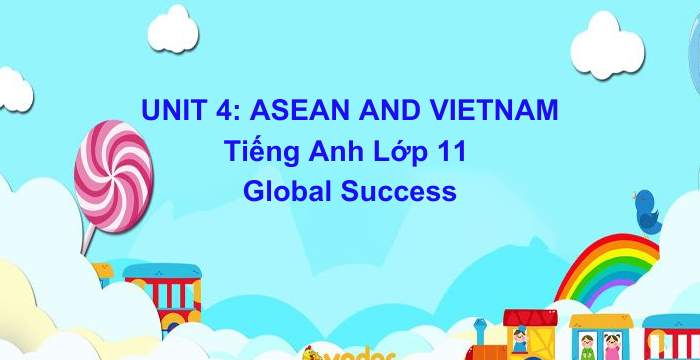
Bài Tập Unit 4 ASEAN AND VIETNAM Tiếng Anh Lớp 11 Global Success (28.11.2024)
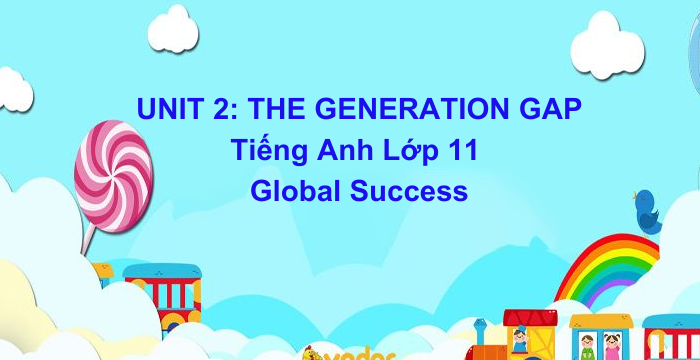
Bài Tập Bổ Trợ UNIT 2 THE GENERATION GAP Tiếng Anh Lớp 11 Global Success (22.10.2024)
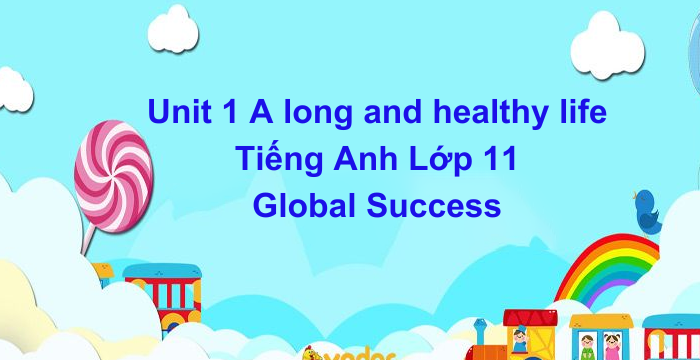
Bài Tập Bổ Trợ UNIT 1 A LONG AND HEALTHY LIFE Tiếng Anh Lớp 11 Global Success (02.10.2024)

Bài Tập Bổ Trợ UNIT 1 A LONG AND HEALTHY LIFE Tiếng Anh Lớp 11 Global Success (01.10.2024)

Bài Tập Bổ Trợ UNIT 1 A LONG AND HEALTHY LIFE Tiếng Anh Lớp 11 Global Success (25.08.2024)

Bài Tập UNIT 5 GLOBAL WARMING Tiếng Anh Lớp 11 Global Success (08.06.2024)

Bài Tập Unit 4 ASEAN AND VIETNAM Tiếng Anh Lớp 11 Global Success (07.06.2024)

Bài Tập Unit 3 Cities Of The Future Tiếng Anh Lớp 11 Global Success (31.05.2024)

Bài Tập Unit 2 The generation gap Tiếng Anh Lớp 11 Global Success (30.05.2024)

Bài Tập Unit 1 A long and healthy Life Tiếng Anh Lớp 11 Global Success (21.05.2024)

File Nghe Unit 10 The Ecosystem Tiếng Anh Lớp 11 Global Success (14.04.2024)

Bài Tập Unit 9 Social Issues Tiếng Anh Lớp 11 Global Success (12.04.2024)

Bài Tập Unit 9 Social Issues Tiếng Anh Lớp 11 Global Success (2.04.2024)

Bài Tập Unit 10 The Ecosystem Tiếng Anh Lớp 11 Global Success (1.04.2024)

File Nghe Unit 9 Social Issues Tiếng Anh Lớp 11 Global Success (21.03.2024)

Bài Tập Unit 9 Social Issues Tiếng Anh Lớp 11 Global Success (19.03.2024)

Unit 8 UNIT 8: Being Independent Tiếng Anh Lớp 11 Global Success(19.03.2024)

Revision On Unit 7 Education Options For School-Leavers Tiếng Anh Lớp 11 Global Success 22.02.2024

File Nghe Unit 8 Being Independent Tiếng Anh Lớp 11 Global Success 19.02.2024

File Nghe Tiếng Anh Lớp 11 Global Success Unit 7 Education Options For School-Leavers

Unit 7 Education Options For School-Leavers Tiếng Anh Lớp 11 Global Success

Unit 7 Education Options For School-Leavers Tiếng Anh Lớp 11 Global Success

File Nghe Tiếng Anh Lớp 11 Global Success Unit 6 Preserving Our Heritage
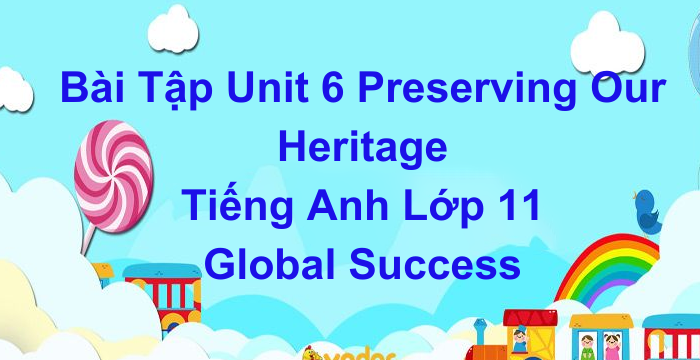
Bài Tập Unit 6 Preserving Our Heritage Tiếng Anh Lớp 11 Global Success
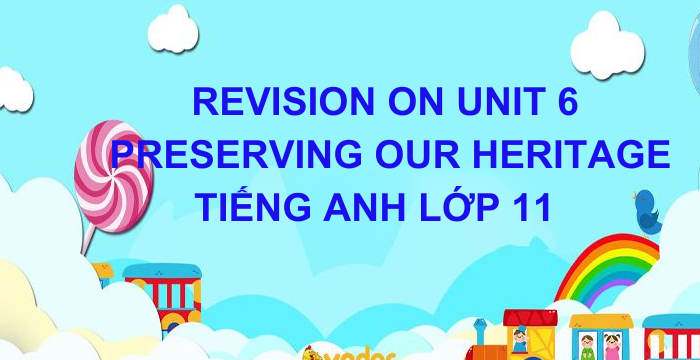
Revision On Unit 6 Preserving Our Heritage Tiếng Anh Lớp 11 Global Success

Unit 6 Preserving Our Heritage Tiếng Anh Lớp 11 Global Success
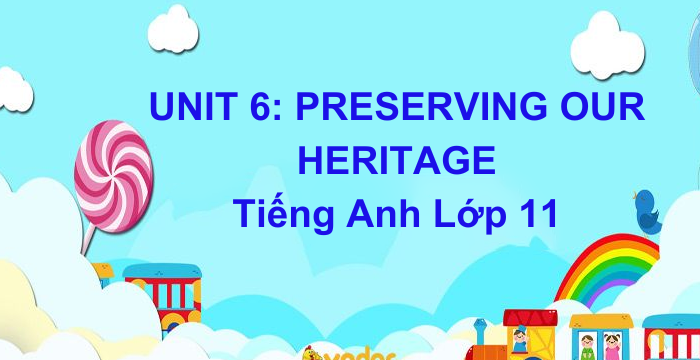
Trắc Nghiệm Unit 6 Preserving Our Heritage Tiếng Anh Lớp 11 Global Success

Bài Đăng Gần Đây

Đề Kiểm Tra Giữa Kì 2 Tiếng Anh Lớp 7 Global Success (3.2.2026)

Đề Kiểm Tra Cuối Kì 1 Tiếng Anh Lớp 10 Global Success (02.01.2026)

Đề Cương Ôn Tập Cuối Học Kì 1 Tiếng Anh Lớp 8 Global Success (30.12.2025)

Đề Kiểm Tra Cuối Kì 1 Tiếng Anh Lớp 6 Global Success (30.12.2025)

